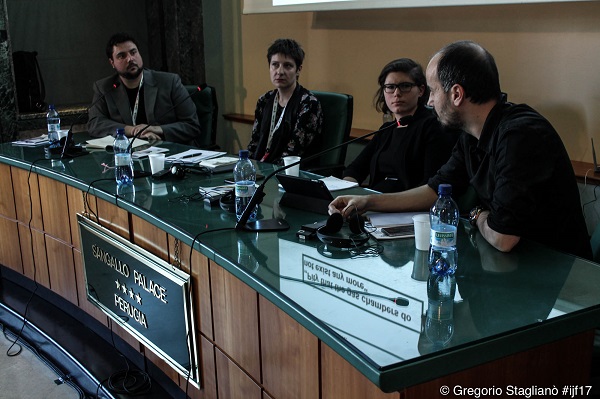
Online harassment against journalists is a way authorites, in some countries, discredit and silent critical voices and dissent. The panel “Online harassment: the new tools of patriotic populism” explored how this phenomenon occurs in different contexts and countries, with the inputs of Irina Borogan, deputy editor of Agentura.ru; Ingrid Brodnig, Austrian author and journalist; Emre Kizilkaya, digital content coordinator of Hürriyet; and Javier Luque Martínez, Digital Media Coordinator at the International Press Institute (IPI).
Understanding the behaviour behind digital attacks is what the IPI has been doing for years in order to offer support to journalists victim of online harassment. A team of experts has been monitoring and tracking online abuse against journalists in several countries, identifying attacks, studying the patterns, and developing specific protocols for protecting journalists.
Javier Luque Martínez said they wanted first to fully understand the phenomenon by analysing examples of attacks. “We did a couple of missions to Turkey, but also in Austria and Hungary,” trying to understand the psycological impact on journalists through one-to-one interviews, he said. After this first research phase, the IPI developed a list of categories: threats of violence, abusive behaviour, and technical interferences.
As for Turkey, the IPI’s interactive database of online abuse against journalists, part of its Ontheline programme, collected 176 instances of violent threats against Turkey between January 2016 and January 2017. These include direct death threats, rape threats, threats of other physical harm, implied threats and threats to others, such as a journalist’s relatives. In addition to threats, currently, there are around 150 journalists in Turkish prisons and #FreeTurkeyJournalists is a campaign that IPI has recently launched with other partners.
Irina Borogan offered an insight on what’s happening in Russia, where many critical of the Kremlin emigrated to the social networks after they lost their jobs in media outlets. Emra Kizilkaya, of the Turkish paper Hurriyet, said that in Turkey there are some ‘trolls armies’ controlled by people close to the Turkish government. In 2013, during the Gezi Park protests, millions of Turks started to use Twitter to voice their dissent. The government tried to different methods to control the platform and eventually blocked it. Ingrid Brodnig said that in Austria, though journalists critical of the government do not go to jain and their social media accounts are not blocked by authorities, there is some hostility towards journalists.